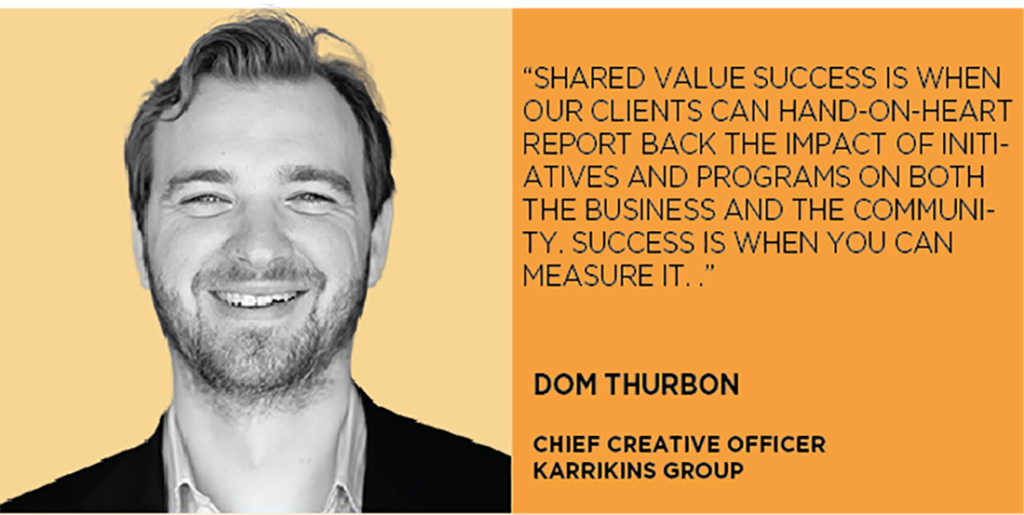 In this month’s member interview series, we feature Dom Thurbon, Founder and Chief Creative Officer, Karrikins Group. Dom shares his experience with shared value and the role it plays at Karrikins Group as a growth orientated consulting firm, working with their clients to form initiatives and programs in business transformation and community investment.
In this month’s member interview series, we feature Dom Thurbon, Founder and Chief Creative Officer, Karrikins Group. Dom shares his experience with shared value and the role it plays at Karrikins Group as a growth orientated consulting firm, working with their clients to form initiatives and programs in business transformation and community investment.
What does shared value mean to you?
We think of shared value as the process of strategically aligning a company’s business strategy with its impact on the world. For us, shared value is a way of seeing the world in which ‘what’s best for business’ and ‘what’s best for society can go hand-in-hand’.
In our company, it has meaning on two levels.
Firstly, is has simple meaning as a process for helping businesses find ways to make more money doing things that also bring about a social benefit. This could be anything from finding ways to source ethical produce where supply chain costs are reduced concurrently with raising living standards in developing nations; all the way through to bringing new products to market that create entirely new revenue streams but also solve a social problem.
Secondly, it has much deeper (and I would argue more interesting) importance as a more fundamental paradigm shift in the way we think about what a business is in the world. It challenges the (destructive, I think) conceptualisation of a business as an entity with the sole purpose of maximising economic returns for its shareholders, at any cost. It walks back the increasingly hollow dehumanisation of the corporation, where it is given all the rights of a person, but none of the responsibilities. And it challenges the notion that our success can ever really be purely measured by how fat we can make our margins.
But whether you view shared value as a simple utility – a tool in the arsenal – for doing better business, or view it as a more profound shift in the way we think about the role of the corporation, I think it’s usefulness is becoming more and more apparent.
What lead you individually to the shared value idea? How did you come across it?
We are like many businesses out there who come to realise they got into the shared value space long before they realised it!
We started in 2006, running large-scale education programs in the community, on behalf of corporations. Our pitch to them was “let us help you build community programs that not only make a real social contribution but also make strategic sense for your business.” We would use phrases like “we think you can do well by doing good” or “there is a way to build this program that changes the world and grows your business”. But we’d never read a word by Porter or Kramer.
For us, we know we were extremely good at building these strategically aligned programs – and that was enough for us in the very beginning.
But we are a research and evidence based company. And as we began to get traction in the market, we started to interrogate more deeply the theoretical underpinnings of what we were doing. This led us to dig deep into the emerging edge of sustainability, corporate citizenship and ultimately shared value literature.
Ten years into our journey, much has changed, and much hasn’t. We still run large-scale community programs, and we still evaluate the business and social value of corporate community investment, as two examples. However the big shift has been our ability to use shared value to help company’s see the much bigger picture of why they make these investments, and just how powerful it can be when they really commit to doing things properly.
What does shared value success look like at Karrikins Group and where are you at on the journey?
We’re nerds. For us, shared value success is when our clients can hand-on-heart report back the impact of initiatives and programs on both the business and the community. Success is when you can measure it.
That’s not always an easy thing, and it’s not always about hard-core quantitative measures. But it is about having the right idea for the type of value you’re trying to create, the theory of change (internally and externally) and the indicators that are going to show you that you’re doing the right things. And how to do those things ever better in the future.
In terms of our journey, I feel like we’re more in the 24 Hours of Le Mans than in a rally sprint. I mean this both for us and the broader market. In some ways – for instance, the sophistication of the language that’s emerging to describe the utility of shared value and why it’s beneficial suggests we are a very long way into the journey. But if you were to look at the percentage of organisations in the market that have explicitly adopted shared value principles to, say, underpin their community investment, then the journey would look much less advanced.
What is your role individually within Karrikins Group to support the company along its shared value journey?
I have the best job in the world. As Chief Creative Officer, I get to act as architect for programs and partnerships that create shared value. This means I get to work in three exciting spaces. Firstly, in the research and thought leadership space, identifying areas of best practice and the latest trends. Secondly, in the program design space, looking at innovative approaches to delivering shared value (with a specific focus on community investment). Thirdly, in the partnership management space, getting to build close relationships with our clients and partners as they go on their journey.
How has practicing shared value helped you individually in your role or career more generally?
It’s helped in a great many ways, but its most powerful contribution for me personally has been the way its shaped my conversations with our market.
I’ve felt for a long time like our legacy approaches to business were sub-optimal – in particular, I have felt a growing sense, especially amongst my generation, of dissatisfaction with having to choose between doing good business and just doing good.
We should never have to leave the corporate sector because it’s ‘time to make a difference’. Why should we have to choose? We shouldn’t.
Shared value helped me realise and articulate that – (a) this feeling is not uncommon, and (b) that there are methodologies for engaging in good business that can drive those outcomes at the same time. It’s given me an increasingly well-understood language that gives the market permission to also call out the limits of a profit-at-any-costs mentality, and to engage, inspire and excite people about the potential to do well by doing good.
What do you think are some pertinent issues in Australia that could be solved through creating shared value?
I hesitate to say a shared value approach can ‘solve’ most issues on its own. My reluctance stems from the fact that I feel strongly that most major, wicked problems we face in the world today require a combination of public, private and individual action to rapidly combat them.
That said, there are areas where shared value can make huge differences, and the evidence shows this.
Finding ways to make ‘going green’ economically profitable for companies and consumers is a huge win that is beginning to be felt. I think shared value approaches to climate change and environmental sustainability are tremendously powerful.
The principles of shared value increasingly underpinning product design in financial services (to drive financial inclusion and empowerment) is a less-publicised thing, but something that will yield tremendous benefit for people. Albeit recent events show there is a long way to go.
Affordable housing is another key area; but perhaps one of the biggest areas is mental health – where organisations are increasingly understanding that keeping their workforce fit and well pays for itself over and over again. Whilst not immediately apparent to everyone as a form of shared value, I would definitely classify it that way.
